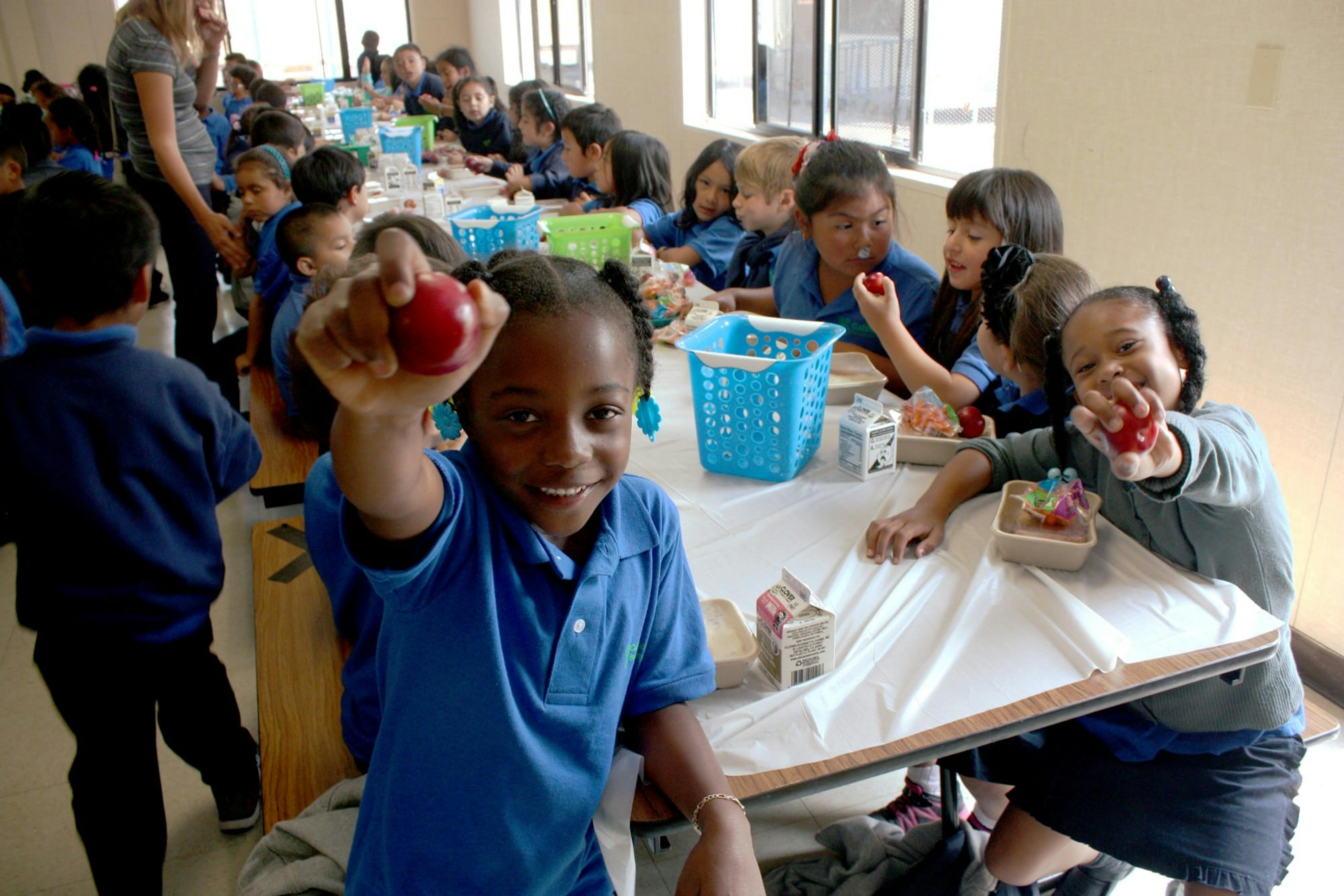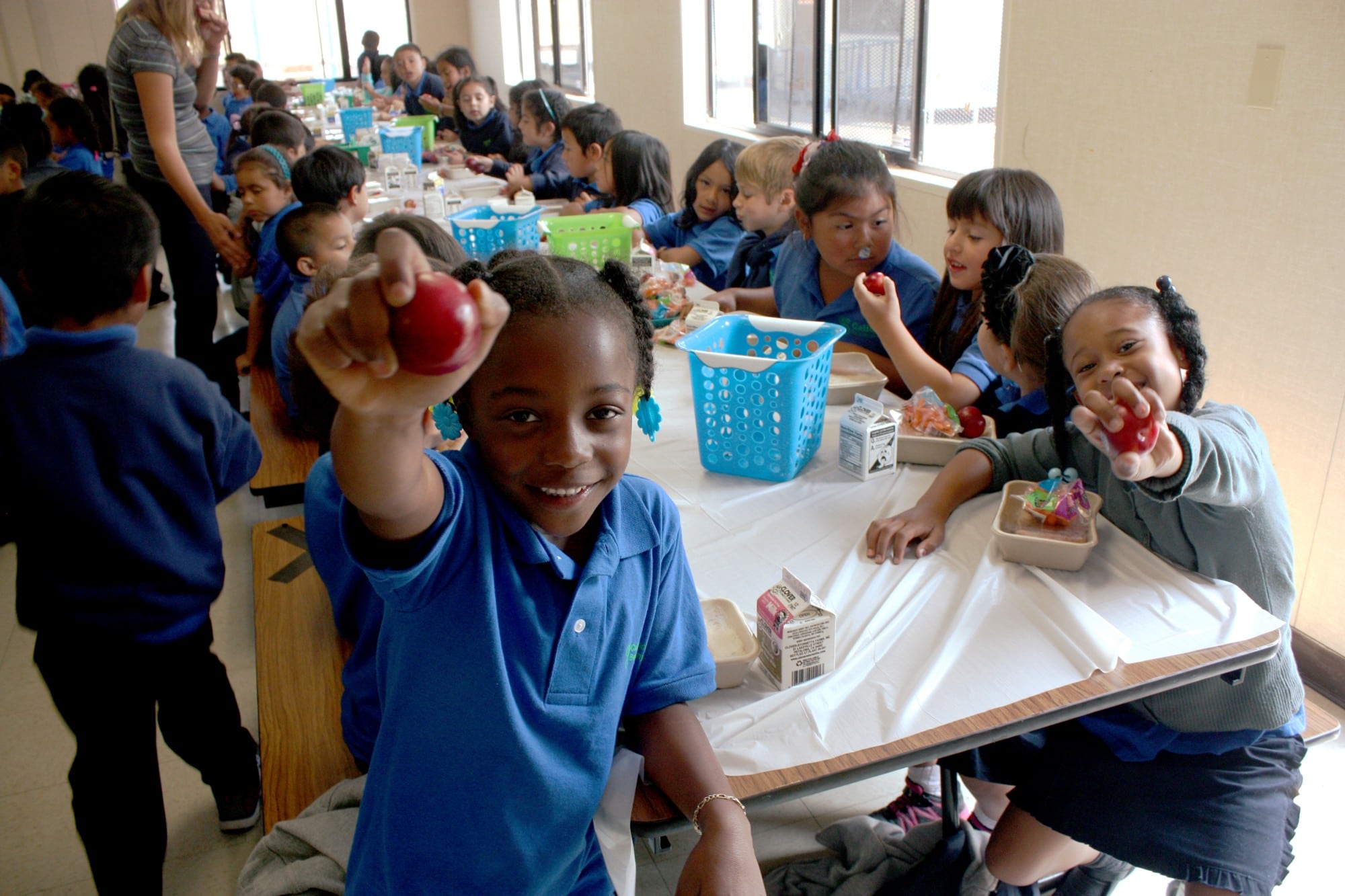
A quick bite with Jennifer Moses + Rui Bao
Every month, we invite an inspiring leader or two from our grantee portfolio to join us in the Tipping Point Cafe. Our “Lunch with Leaders” series is an opportunity for our team to hear directly from those on the ground in the fight against poverty, what they’re most excited about, and what keeps them hungry to do more.
In 1990, the Richmond School District went bankrupt and had to create a regional school district, now known as the West Contra Costa Unified. It has among the poorest student outcomes in the entire state of California, and very few quality school options. Caliber Schools was created to help change that. Through its network of free, non-selective charter schools, Caliber provides a rigorous, college-preparatory education for low-income Bay Area students.
Caliber came to us as a young start-up with big goals — and enormous potential. The organization joined the Tipping Point portfolio in 2014, and they’ve been continuing to iterate and grow ever since. We caught up with Co-Founder + COO Jennifer Moses and Head of Data + New Schools at Caliber, Rui Bao, during a recent “Lunch with Leaders” to get an update on the state of things in West Contra Costa.
Q: Tell us about your first full year of Caliber Schools. How are things going?
A: With Tipping Point’s help, Caliber had a great inaugural year at our first K-8 site in Richmond. We opened with 300 children, have more than 600 in our halls today, and had 95% student attendance with zero expulsions.
This is, of course, not without challenges. Just like any start-up, we had stumbling blocks and hurdles. For example, we spent a lot of time aligning around data. We had to make sure that how we measure ourselves ties to metrics that teachers understand and feel helps improve their classrooms. For example, we made sure that our formative assessments are all Common Core aligned, that each question is literally tagged with the Common Core standards it tests. That way, the results show exactly what areas to target with each student. Our blended software and EngageNY lesson plans have the same tags so we can pick lessons based on the standards each student needs to address.
Q: What makes Caliber different from other schools?
A: We do a lot of blended learning. We use whole class instruction, one-to-one, peer tutoring, small groups, online, projects. You name it, we will try it. Different things work for different children. We’re also a K-12 model and put an emphasis on social and emotional learning from the get-go. I do think most charters have added that over time, but typically it’s not as much of a focus as students get closer to college. We continue the focus through senior year of high school.
Q: What’s next? Do you have expansion plans?
A: We do! We plan to expand to six schools by 2020. As our next step, Caliber is focused on permanently securing a K-8 campus in Vallejo, which will serve 800–900 students annually in a district that has very few charter schools to meet tremendous demand. We’re purchasing four acres of land in the center of Vallejo and will spend around $15 million to build a permanent school facility on the site. Our immediate task is to raise $3 million in equity to complete the project. If successful, this site will be a model for future campus development.
Q: Why Vallejo?
A: We’ve spent a ton of time there with parents, holding classes to educate them about our program. The support and enthusiasm we’ve received is incredible. We saw over 330 applications for next school year, even before the site was secured!
A top priority in Vallejo is to provide wrap-around services. It is our goal to find health partners and we’ll have a dedicated space for mental and physical health services right on campus. Whenever there is trauma for students, whether a shooting or the loss of a home, the whole community can be impacted. Being able to provide onsite, embedded mental health services to our students, as well as our staff, will allow us as a school to rely on those experts when needed while maintaining our focus on students’ other needs as well.
In fact, we already have a model for this kind of rich partnership work with some of Tipping Point’s other grantees. There are many Teach For America alums and core members in our teaching force, for example. And we work with Sunny Hills and Reading Partners. This type of collaboration really speaks to the complexity of poverty and the need to respond holistically. The environment in Vallejo is no exception.
Q: Since this is technically a Lunch with Leaders, we have to ask…tell us about the lunchtime scene at Caliber Beta Academy.
A: Lunches are an integral part of Caliber! For us, lunch is part of socio-development time for our students. Adults eat with kids (teachers, aides, parent volunteers, and our central staff all join!), food is served family-style, and students are responsible for cleaning up after themselves. Kids have “table captains” who grab fruits and milk and pass it out for the table, which teaches them to share, to be patient, and to listen to each other. For staff, it’s a great way to get out of the office and talk to kids about what they have been learning and what they like and don’t like. If anyone ever wants to join Caliber kids for lunch, just let us know!
Want to learn more about Caliber Schools? Read more here about the Caliber model and what drew Caliber co-founders Jennifer Moses and Ron Beller to the work they do.


